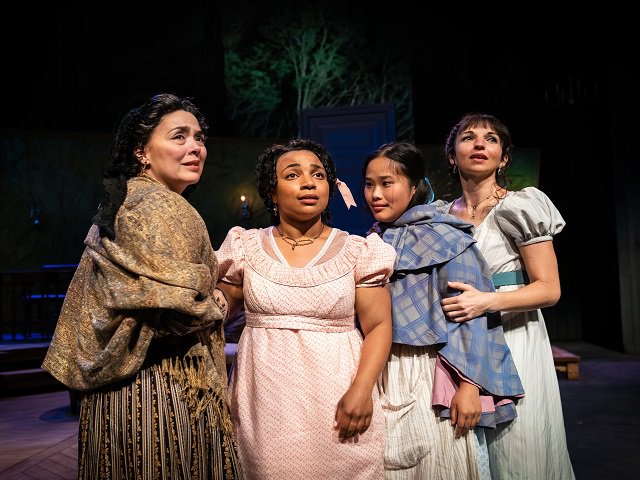If American Players Theatre’s 2015 production of the Jane Austen classic Pride and Prejudice left you longing for more stories of English moors, society balls, bonnets, and unspoken yearning, or perhaps the recent hit TV series Bridgerton has you in a Regency Era romance frame of mind, good news! APT’s long-awaited Austen offering Sense and Sensibility opened on June 25 and is running Up the Hill through Oct. 9. Adapted by Jessica Swale and directed by Marti Lyons, this classic costume drama leans more heavily on comedy than passion — either freely sensed or sensibly restrained. But there are solid performances throughout, whether the characters lead with their hearts or their heads as they move through the world.
Sense and Sensibility is the story of a widow and her three daughters who have been essentially disinherited after the death of the family patriarch. The Dashwood women must depend on the kindness of distant relatives and the hope of marriage to wealthy husbands in order to survive in early 19th century England. And beyond the financial incentive for wedding, of course, both the eldest daughter — practical, reserved, and proper Elinor (Laura Rook) and the younger, more impetuous Marianne (Samantha Newcomb) — wish to marry for love. But to find suitable suitors they must navigate the mores of fashionable society, avoid being slandered by gossip, and accept that as young women without dowries or the opportunity to earn their own living, their fates rest in the hands of others.
As she did in Pride and Prejudice, Rook easily assumes the role of the reserved, pensive sister who worries about the family’s meager budget, makes the decision to let most of the house staff go, and tries to guide and comfort her younger siblings as they adjust to a much simpler life in a country cottage, without their father. Wrapping her pashmina tightly around her shoulders while looking longingly into the ocean, or wrinkling her brow as she carries on making the best of their new lives, it is easy to see Rook modulating her feelings so they do not overwhelm her manners. Confidante to her younger sister, she is constantly chiding Marianne about her outbursts of emotion, her honest and open hostility to her snide sister-in-law Fanny (a delightfully disapproving Tracy Michelle Arnold), and her reckless pursuit of the charming scoundrel Willoughby (Ty Fanning). For her part, Samantha Newcomb fills Marianne with enthusiasm for dramatic poetry, an intoxication with moving music, and a giddiness for grand romantic gestures. Far from hiding her feelings to be polite, she wears her overflowing heart on her sleeve and her disappointments in storm clouds that settle in sharp looks, clenched fists, and determined strides. Rook and Newcomb are extremely well paired as women on opposite ends of the emotional spectrum.
Underneath the angst about men and money, the Dashwood clan has familial love in spades. Nancy Rodriguez is the calm voice of experience as the matriarch Mrs. Dashwood, providing gentle words of encouragement for all three of her girls, although she is working through her own grief. Even precocious young Margaret (played by the scene-stealing Isabelle Bushue) can tell when her much older siblings need a hug, although most of her attention seems to focus on the bugs, fish, and feathers she collects and studies as an aspiring naturalist.
Bushue’s interjections and great comic timing punctuate many of the scenes, along with one-liners and sight gags performed by most of the minor characters. But Sarah Day and Brian Mani outdo them all as the loud country relations with an irrepressible sense of mischief — especially where matchmaking is concerned. Waddling across the stage like a gossip-seeking goose, Day’s Mrs. Jennings isn’t satisfied until she wheedles and pokes and pries the latest romantic intrigues out of her guests. Mani’s Sir John also delights in the good natured ribbing of the younger set between hunting, fishing and games of cards and croquet.
Unfortunately all the gags overwhelm much of what Austen fans treasure about the romance that is fundamental to the book — the almost unbearable tension between would-be lovers who have trouble articulating the depth of their admiration. As a stiff and awkward Edward Ferrars, Jamal James gives Elinor few reasons to remember his visits, let alone pine after him. And instead of the steadfast soldier, biding his time while harboring strong feelings for Marianne, Marcus Truschinski’s Colonel Brandon is positioned as a foolish also-ran who could never compete with the impulsive and extravagant Willoughby. The eventual matches are meant to come about despite adversity, but the double wedding that finishes the show feels unearned, if not illogical.
The structure and pacing of the play is also problematic in Jessica Swale’s adaptation of the Austen text. Cramming all the characters and conversations from a novel into a script is inadvisable if not impossible, but it feels like Swale tries. As a result, many short scenes are smashed together, some wordless scenes are used as transitions, and any passage of time is repeatedly omitted to keep the play moving. And while these jump cuts are fine in a film, they are jarring to theater audiences. The end result feels both rushed and repetitive. The set, by Yu Shibagaki, is composed of a long, ornate green wall interrupted by a single lavender door. It does little to recall the time period or provide an interesting, malleable background for a dozen distinct settings. The costume design, by Rachel Anne Healy, is similarly disjointed. Color and fabric choices don’t tell a cohesive story and the ball scene, where the most elegant attire should be on display, looked cobbled together.
Strong performances from the leads, as well as those playing minor characters, assure an amusing evening. But Austen fans may want to revisit the story in another medium if they are looking for emotional nuance.


